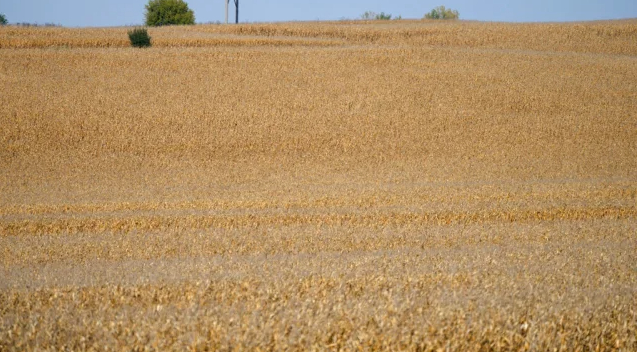November 27, 2025 | 05:29 GMT +7
November 27, 2025 | 05:29 GMT +7
Hotline: 0913.378.918
November 27, 2025 | 05:29 GMT +7
Hotline: 0913.378.918

Fields of corn wait for harvest on a farm Friday, Oct. 8, 2021, near Garretson, S.D. Photo: AP
In 2020, Mexican President Andrés Manuel López Obrador announced the country would prohibit genetically modified corn by 2024, prompting U.S. lawmakers to worry that the change would hurt American farmers and violate trade agreements.
Alexis Taylor, under secretary for trade and foreign agricultural affairs for the Department of Agriculture (USDA), answered questions from lawmakers Wednesday about the response to López Obrador’s decree.
“As it is for many other genetically engineered products that have been studied for decades, the safety of these products are not in question,” Taylor said.
Congress must pass legislation known as the farm bill every five years to set standards for agriculture, nutrition, forestry and conservation. The Senate Agriculture Committee began the process last year by holding field hearings in Michigan and Arkansas.
The Wednesday committee hearing focused on trade and horticulture, with López Obrador’s announcement at the forefront of lawmakers’ minds.
Sen. Roger Marshall (R-Kan.) asked Taylor about the Biden administration’s response to the GMO corn ban and if they would enforce trade agreements between the U.S. and Mexico in the United States-Mexico-Canada Agreement (USMCA).
“In the meantime, the administration has refused to trigger the USMCA to contest Mexico’s planned exclusion of American corn,” Marshall said. “What are we waiting for? What are we waiting for to trigger this mechanism? I mean, I’m tired of talking about it, forming committees and praying about it. We think it’s time for action.”
Taylor said she visited Mexico two weeks ago to highlight concerns about the ban and that officials are still working to find a solution, given the USDA said the ban could disrupt “billions of dollars” in trade.
“We have been very clear that the USMCA gives us a process to go down if we cannot find resolution on this issue and that we reserve all of those rights,” Taylor said. “But at least today we are still productively engaging and hope to find a resolution that doesn’t disrupt trade, impact our producers and ultimately impact negatively Mexican livestock producers who are dependent on this product as well.”
Sen. Deb Fischer (R-Neb.) led a bipartisan group of 25 senators in writing a letter in December expressing concern about Mexico’s proposed prohibition of genetically engineered corn.
“I appreciate [Taylor] standing firm on that and making it clear that GMOs are safe, they are secure, they are healthy, they help to feed the world,” Fischer said.
Senators also asked witnesses about international food aid programs, how to strengthen foreign and domestic markets and protecting science-based advancements in the agriculture industry.
Committee hearings to discuss commodity programs, crop insurance and credit, nutrition programs, conservation, and forestry will continue in coming weeks as part of drafting this year’s farm bill.
Agriculture Committee Chairwoman Debbie Stabenow (D-Mich.) emphasized the significance of prioritizing support for American farmers in the legislation.
“Whether they are selling to their neighbors or exporting products globally — and whether they are growing traditional commodities, specialty crops, or organics — the farm bill helps farmers put food on tables here and around the world,” Stabenow said. “We all have a stake in continuing to make sure this happens. That’s what this farm bill is all about.”
(The Hill)

(VAN) A new study reveals how the simultaneous effects of ocean acidification, salinity and loss of oxygen are making the world more fragile.

(VAN) Hopes are growing that the creation of the first 3D turkey gut model could be a turning point in the battle against the virulent blackhead disease.

(VAN) Tyson, America’s biggest meat supplier, plans to shutter one of its largest beef processing plants as the industry continues to struggle with low cattle supplies and political pressure from Washington.

(VAN) New FAO study shows how digital solutions are empowering farmers and fishers to prevent losses and build resilient agrifood systems.

(VAN) Brazil's COP30 presidency pushed through a compromise climate deal on Saturday that would boost finance for poor nations coping with global warming but that omitted any mention of the fossil fuels driving it.

(VAN) Poultry farmers in the UK have been warned that they could face one of the worst winters yet for bird flu.

(VAN) Prices of main-crop paddy have risen sharply, with jasmine rice hitting 16,100 baht per tonne — the highest level in years.